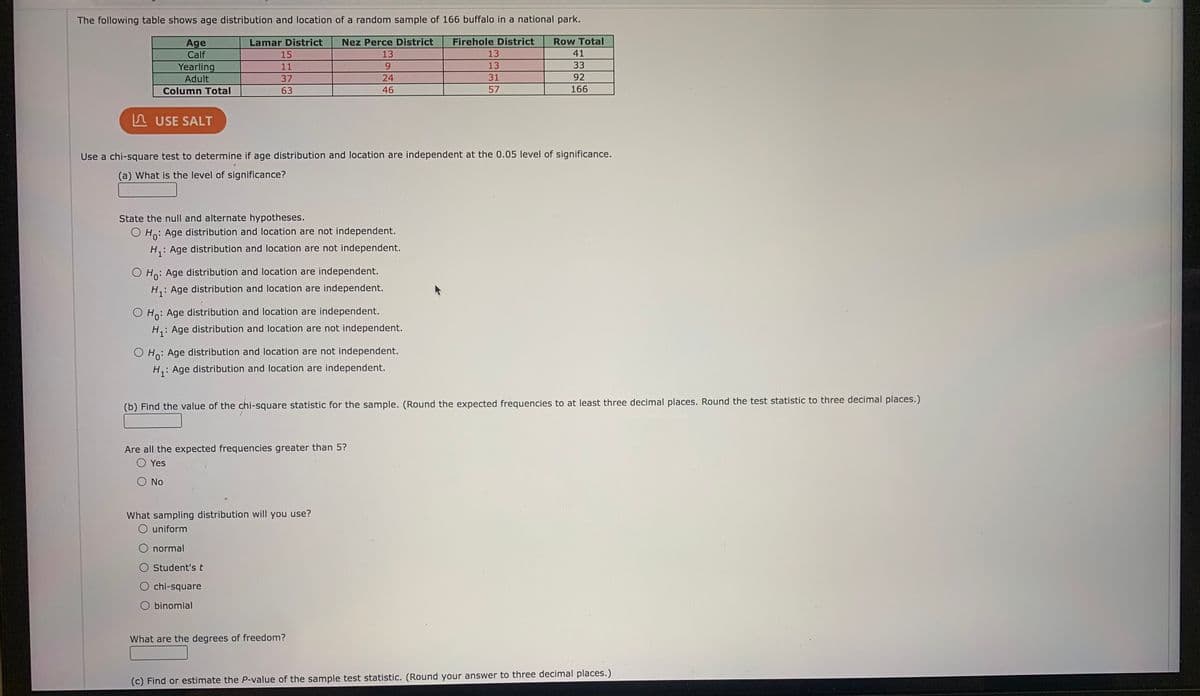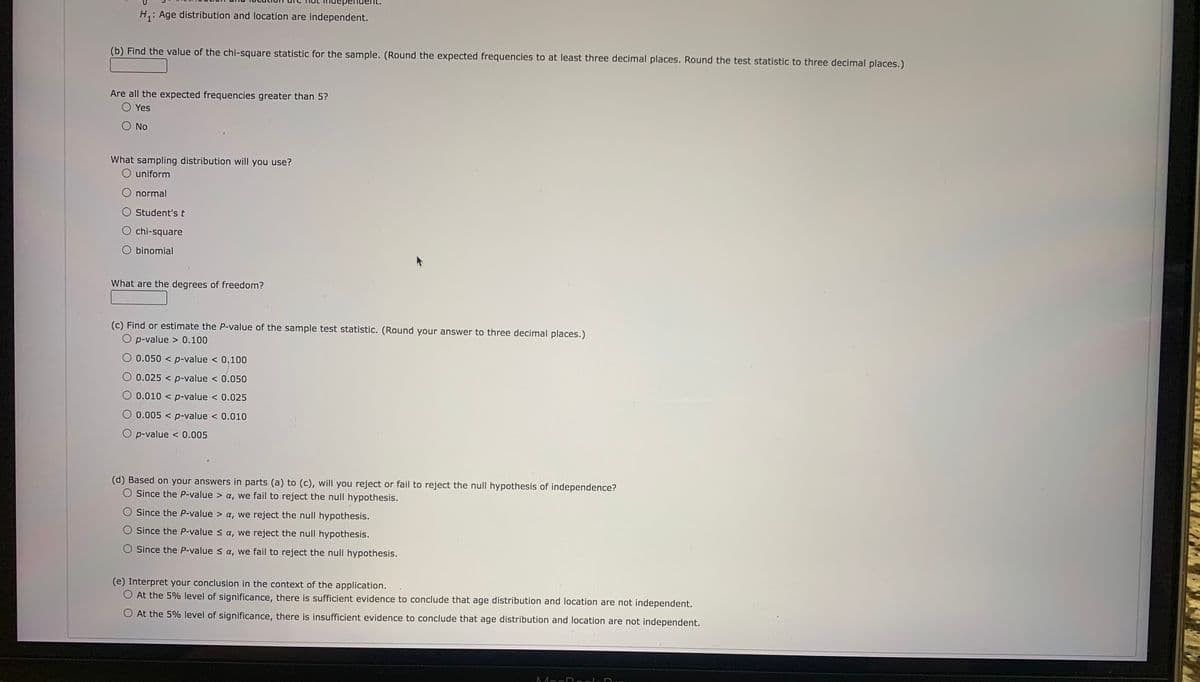Nez Perce District Firehole District Row Total Age Calf Lamar District 15 13 41 33 92 13 Yearling Adult Column Total 11 37 24 63 46 57 166 n USE SALT Use a chi-square test to determine if age distribution and location are independent at the 0.05 level of significance. (a) What is the level of significance? State the null and alternate hypotheses. O Ho: Age distribution and location are not independent. H: Age distribution and location are not independent. O Hn: Age distribution and location are independent. H,: Age distribution and location are independent. O Ho: Age distribution and location are independent. H,: Age distribution and location are not independent. O Ho: Age distribution and location are not independent. H,: Age distribution and location are independent. (b) Find the value of the chi-square statistic for the sample. (Round the expected frequencies to at least three decimal places. Round the test statistic to three decimal places.) Are all the expected frequencies greater than 5? O Yes
Nez Perce District Firehole District Row Total Age Calf Lamar District 15 13 41 33 92 13 Yearling Adult Column Total 11 37 24 63 46 57 166 n USE SALT Use a chi-square test to determine if age distribution and location are independent at the 0.05 level of significance. (a) What is the level of significance? State the null and alternate hypotheses. O Ho: Age distribution and location are not independent. H: Age distribution and location are not independent. O Hn: Age distribution and location are independent. H,: Age distribution and location are independent. O Ho: Age distribution and location are independent. H,: Age distribution and location are not independent. O Ho: Age distribution and location are not independent. H,: Age distribution and location are independent. (b) Find the value of the chi-square statistic for the sample. (Round the expected frequencies to at least three decimal places. Round the test statistic to three decimal places.) Are all the expected frequencies greater than 5? O Yes
College Algebra (MindTap Course List)
12th Edition
ISBN:9781305652231
Author:R. David Gustafson, Jeff Hughes
Publisher:R. David Gustafson, Jeff Hughes
Chapter8: Sequences, Series, And Probability
Section8.7: Probability
Problem 5E: List the sample space of each experiment. Rolling one die and tossing one coin
Related questions
Question

Transcribed Image Text:The following table shows age distribution and location of a random sample of 166 buffalo in a national park.
Lamar District
Nez Perce District
Firehole District
Row Total
Age
Calf
15
13
13
41
13
33
Yearling
Adult
11
92
31
57
37
24
Column Total
63
46
166
A USE SALT
Use a chi-square test to determine if age distribution and location are independent at the 0.05 level of significance.
(a) What is the level of significance?
State the null and alternate hypotheses.
O Ho: Age distribution and location are not independent.
H,: Age distribution and location are not independent.
O Ho: Age distribution and location are independent.
H,: Age distribution and location are independent.
O Ho: Age distribution and location are independent.
H,: Age distribution and location are not independent.
O Ho: Age distribution and location are not independent.
H,: Age distribution and location are independent.
(b) Find the value of the chi-square statistic for the sample. (Round the expected frequencies to at least three decimal places. Round the test statistic to three decimal places.)
Are all the expected frequencies greater than 5?
O Yes
O No
What sampling distribution will you use?
O uniform
O normal
O Student'st
chi-square
O binomial
What are the degrees of freedom?
(c) Find or estimate the P-value of the sample test statistic. (Round your answer to three decimal places.)

Transcribed Image Text:H,: Age distribution and location are independent.
(b) Find the value of the chi-square statistic for the sample. (Round the expected frequencies to at least three decimal places. Round the test statistic to three decimal places.)
Are all the expected frequencies greater than 5?
O Yes
O No
What sampling distribution will you use?
O uniform
O normal
O Student's t
chi-square
O binomial
What are the degrees of freedom?
(c) Find or estimate the P-value of the sample test statistic. (Round your answer to three decimal places.)
O p-value > 0.100
O 0.050 < p-value < 0,100
O 0.025 < p-value < 0.050
O 0.010 < p-value < 0.025
0.005 < p-value < 0.010
O p-value < 0.005
(d) Based on your answers in parts (a) to (c), will you reject or fail to reject the null hypothesis of independence?
O Since the P-value > a, we fail to reject the null hypothesis.
O Since the P-value > a, we reject the null hypothesis.
O Since the P-value < a, we reject the null hypothesis.
O Since the P-value < a, we fail to reject the null hypothesis.
(e) Interpret your conclusion in the context of the application.
O At the 5% level of significance, there is sufficient evidence to conclude that age distribution and location are not independent.
O At the 5% level of significance, there is insufficient evidence to conclude that age distribution and location are not independent.
Expert Solution
This question has been solved!
Explore an expertly crafted, step-by-step solution for a thorough understanding of key concepts.
Step by step
Solved in 2 steps

Recommended textbooks for you

College Algebra (MindTap Course List)
Algebra
ISBN:
9781305652231
Author:
R. David Gustafson, Jeff Hughes
Publisher:
Cengage Learning

College Algebra (MindTap Course List)
Algebra
ISBN:
9781305652231
Author:
R. David Gustafson, Jeff Hughes
Publisher:
Cengage Learning